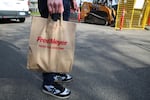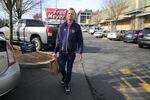Instacart shopper Carl Momberger belted out his preferred hand washing song (upon request) as he delivered groceries in southwest Portland.
It’s the first verse of Ween’s “The Mollusk” from 1997.
“That’s 20 seconds, and it washes your hands,” he said.
The full-service Instacart shopper has been washing his hands a lot lately, as the phrase “social distancing” has exploded in the national lexicon.
To achieve social distancing, Oregon Gov. Kate Brown temporarily shut down the state's public schools. She and Washington Gov. Jay Inslee both banned the largest gatherings. More and more companies in Oregon and Washington have been asking their employees to work from home as infections from the novel coronavirus spread to pandemic proportions.
But many people can’t work from home. In fact, their livelihood may depend on coming to you.
These are the people who fix your plumbing, clean your house or help care for your kids. They include gig workers such as Momberger, who can do a grocery run on short notice.

Instacart shopper Carl Momberger delivers groceries in Portland, Ore. on March 5, 2020. As the new coronavirus spread in the Northwest, he hoped customers would let him leave the bags at their door.
Kate Davidson/OPB
The weekend Oregon announced its first COVID-19 case was intense for Momberger. He sprinted to fill orders from the app.
“Sanitizers, hand sanitizers, toilet paper, milk, bread,” he said. “In a fever pitch it seemed that a lot of the population had Instacart bring them entire warehouse stores to their homes.”
That’s the thing about social distancing – in order for us to stay home, sometimes other people have to go out.
Momberger said orders soared again this week when the World Health Organization declared a pandemic.
He can use the extra income. As a gig worker, he doesn’t get sick pay. He doesn’t have health insurance. Most people in the gig economy are classified as independent contractors, not employees, so they don’t qualify for employer-sponsored benefits.

Full-service Instacart shopper Carl Momberger heads out to make a grocery delivery in Portland, Ore. on March 5, 2020. He said orders flooded in when the first COVID-19 cases were announced in the state.
Kate Davidson/OPB
Momberger has a side hustle making small batch jam and he's saving money in case he gets sick and can't work. He had one request for his Instacart customers:
“I really just hope that the people that are sick will give us an option to just leave it at the front door,” he said. “Limit contact and exposure. We are out there doing this for you, putting ourselves at risk in a sense, and the last thing we need is to be walking right into it.”
Also, no more signing for Costco orders on his grubby phone, he said.
In response to the coronavirus outbreak, Instacart announced a 30-day program to compensate shoppers who are diagnosed with COVID-19 or "placed in mandatory isolation or quarantine, as directed by a local, state, or public health authority." The company wouldn't say whether diagnosis requires a positive test result. Testing has been limited in the U.S. and many people with milder symptoms may never know if they've experienced COVID-19.
Related: School Closures 'Will Not Stop The Spread Of COVID-19,' Brown Warns
Instacart also announced it will start giving its part-time employees one hour of sick pay for every 30 hours worked. That doesn’t apply to full-service shoppers like Momberger or Jordan Anderson, an activist who has pushed Instacart on wages and benefits.
Instacart shopping is Anderson’s primary source of income. During the coronavirus outbreak she’s become hyper aware of her body, how she’s feeling and how other people perceive her.
“I got the stink eye from a Girl Scout the other day for coughing,” she said. “Barely a cough.”
She said she’d seek medical care if she were experiencing severe symptoms. Otherwise – with a mild cough or low fever – she’d probably keep working.
“Because I can’t afford not to work,” she said. “Every week I have specific bills that have to get paid. And then the last two weeks of the month are all about rent. Those are my 10-12 hour days that I can’t miss or I don’t have a roof over my head.”
That’s a comment echoed again and again by gig workers, who make up a big part of the come-to-you economy. They don’t get benefits. Their jobs involve intimate contact with the public or public spaces, and they’re among the ranks of low wage workers who can’t afford to stop.
“What if I get infected?” asked Uber driver Mario Salazar, who has four children at home in Troutdale. “I’m the only one that provides at my house. So I’m concerned that I will not be able to provide for my family.”
He said workers like him are forgotten. He wondered if he should go back to driving a bus.
“All l have is prayers at this moment,” he said

Uber and Lyft driver Stephanie Strahan pictured in Portland, Ore. on March 9, 2020. She expressed concern about driving people to and from hospitals during the coronavirus outbreak.
Kate Davidson/OPB
Salazar and fellow driver Stephanie Strahan both sit on a committee that advises the Portland Bureau of Transportation about issues in the ride-hailing community. She drives for Uber and Lyft. Strahan isn’t panicked, but she does feel cautious - especially about taking passengers to and from hospitals.
“I think everyone knows that it’s cheaper to get an Uber than it might necessarily be to get an ambulance,” she said.
She remembers once driving a woman in labor to the hospital. Another time, she said, a paramedic summoned her on a patient’s behalf. Just the other day, she picked someone up at a hospital.
“The problem with that was, I was just given an address. It didn’t tell me I was going to a hospital,” she said. “This person was actually there for a job interview, so it wasn’t somebody sick but, you never know, they were still in the hospital.”
Strahan feels lucky that she’s low income enough to be covered by the Oregon Health Plan. Still, she has to keep driving to make ends meet. Her main worry isn’t getting sick. It’s that things will get so bad that ride-hailing services will be suspended.
An Uber representative downplayed that possibility at a public meeting in Portland this week.
Like Instacart, Uber and Lyft – famous for not providing benefits – now say they'll compensate workers who are diagnosed with COVID-19 or placed in individual quarantine by a public health authority.
As with Instacart, it’s unclear how much that compensation would be or if diagnosis requires a diagnostic test.
